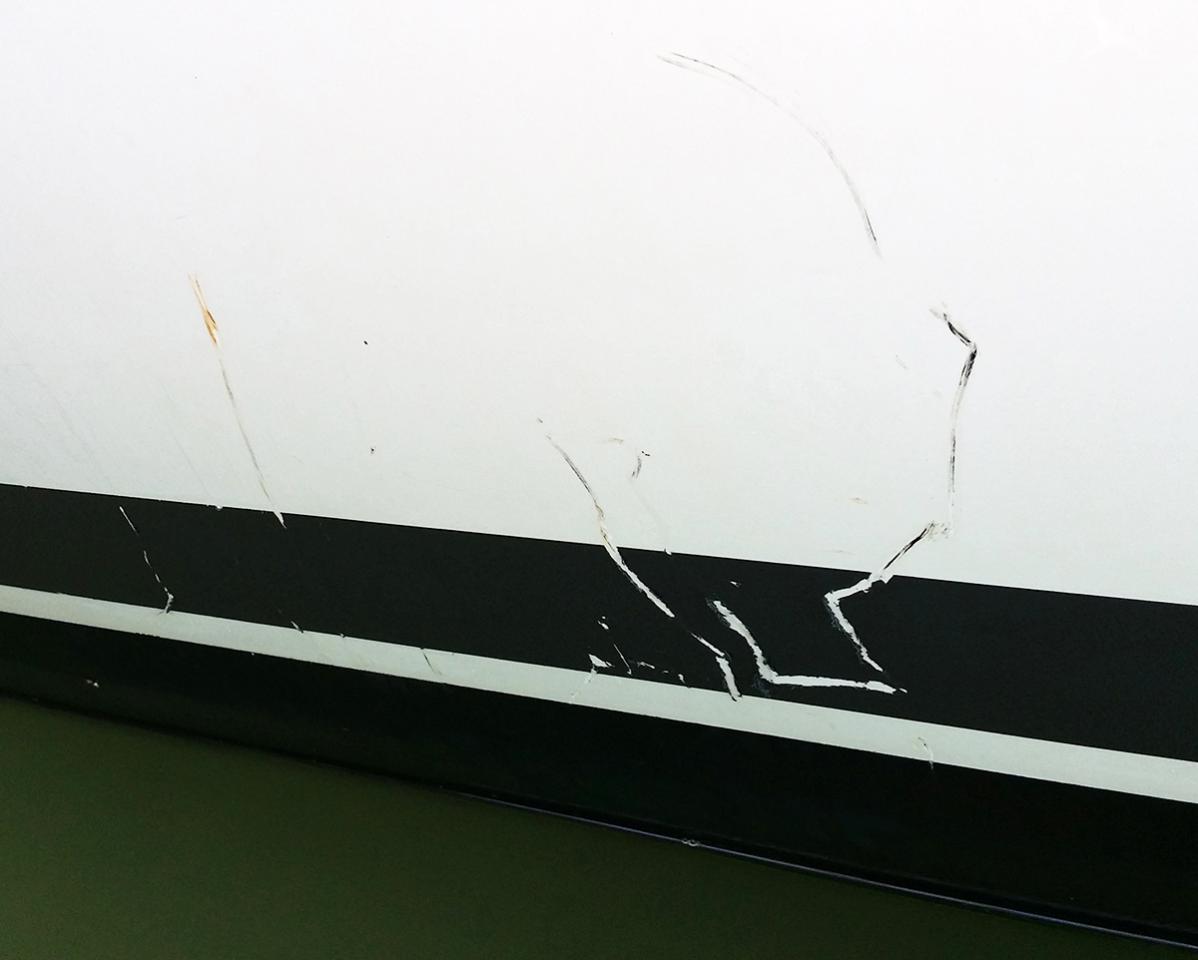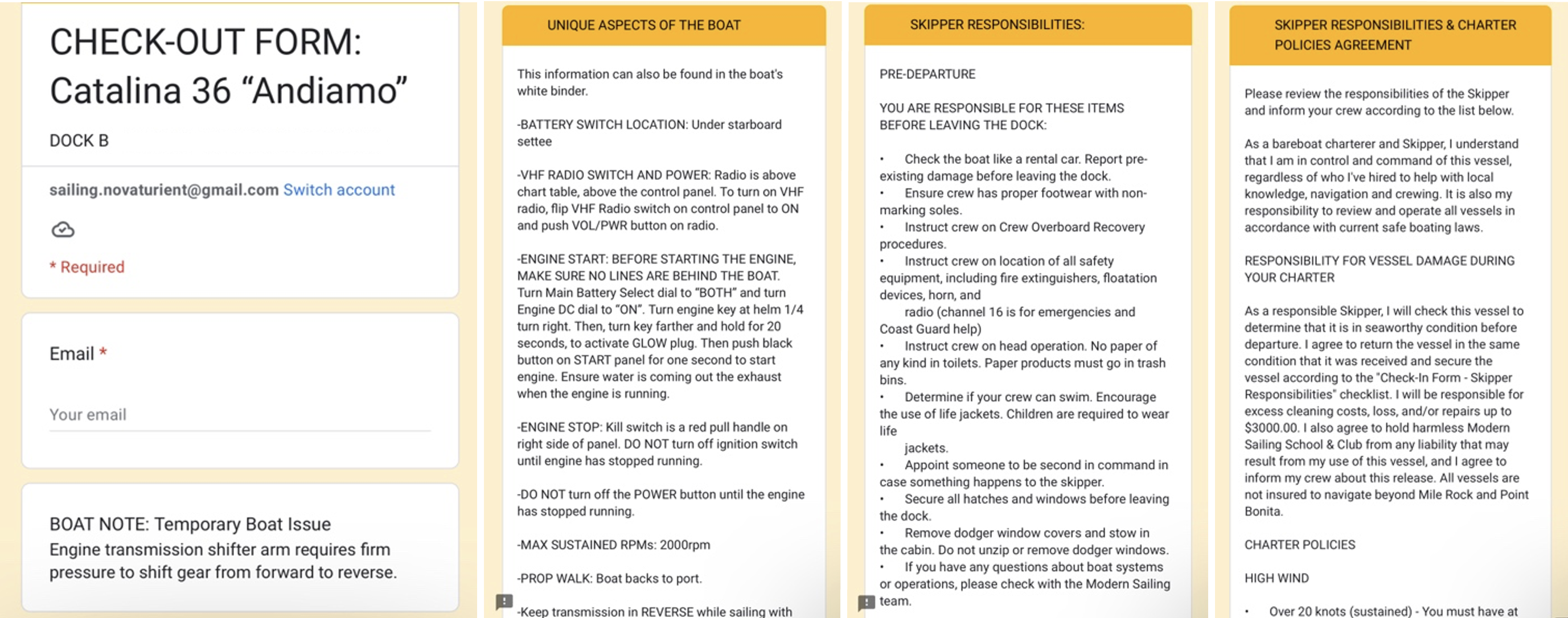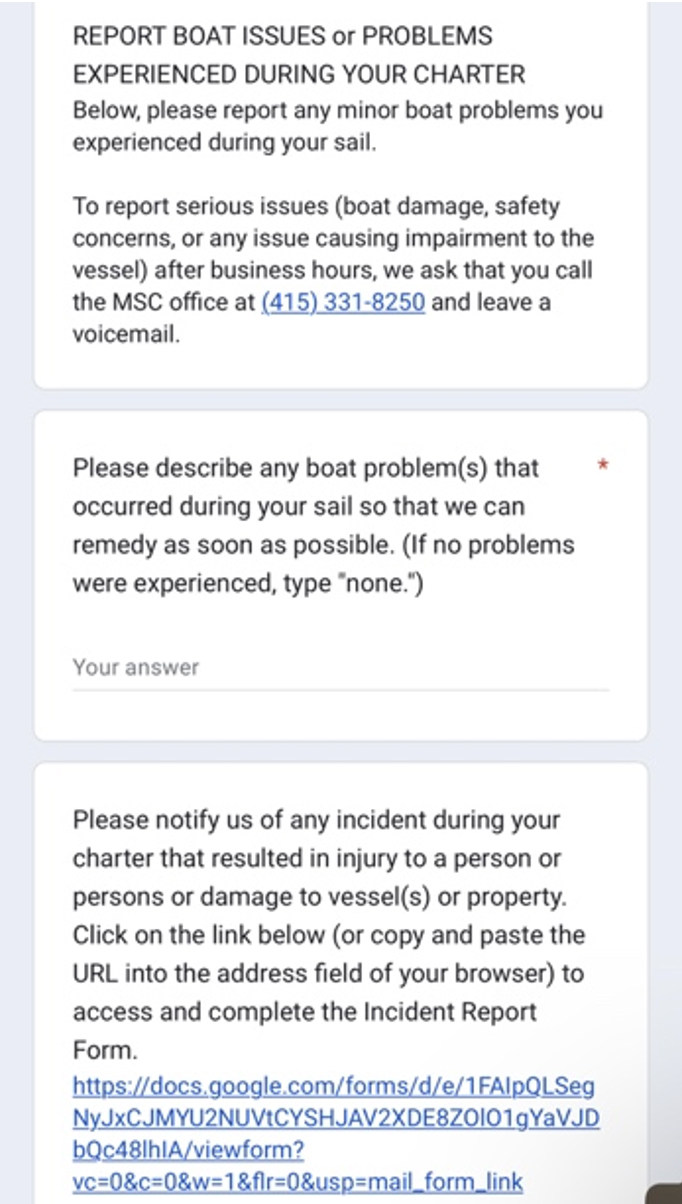
Sailing can be relaxing, refreshing, invigorating, and sometimes challenging. As an activity that involves human nature and working with the temperamental forces of wind and waves, an incident or accident that results in loss or damage can happen to any skipper. From our own experience as sailors, we know that it has happened, or will happen, to every one of us at some point.
We don't want anyone to shy away from sailing out of fear of errors, rather to simply welcome the responsibilities that are inherent with the joys and privileges of sailing. We accept that incidents and errors come with the territory, so we prefer to approach our members who have experienced an incident aboard a Modern Sailing boat with good will and understanding.
If/when it happens to you, we know chances are that you will feel embarrassed, rattled, or worse, scared. We have all felt this way before too – or will eventually! Also, while we expect you to accept responsibility for an oops, ouch, or accident, we will also encourage you to learn from the experience and get back to enjoying sailing again as soon as possible.
In this article, you'll learn in detail about your responsibilities as a skipper, and should an incident occur, what to do and what to expect from Modern Sailing.
CONTENTS
- Incident Prevention – Knowledge is Power
- With Power Comes Responsibility
- What types of problems or incidents should you report? (The Oopes, Ouches, and Accidents)
- THE "OOPSES"
- Equipment Loss
- Damaged Components
- Sail Tears
- THE "OUCHES"
- Engine Damage
- Prop Wrap
- Running Aground
- THE ACCIDENTS
- Collision with Fixed Objects
- Collision with Other Vessels in the Marina
- Collision with Other Vessels outside the Marina Resulting in Injury, Damage, or Loss
- THE "OOPSES"
- Modern Sailing’s Follow-Up
Incident Prevention – Knowledge is Power
The good news is that most of your time on the water will be enjoyed without incident. The bad news is that those incident-free charters can lull you into complacency, leaving you caught unprepared if something should go wrong. More good news – there is abundant information available at your fingertips that will help you prevent incidents and know how to respond to a variety of situations.
The electronic Boat Pre-Cruise (Check-Out) Form contains a ton of essential (and helpful!) information about your responsibilities as a skipper. Pay close attention to the details on this form. You can also find the insurance deductible amount for the particular boat you are on in the Boat Pre-Cruise (Check-Out) Form.
In particular, these sections of the form are tremendously valuable to help you prevent incidents for which you might be held responsible:
- BOAT NOTE(S)
- UNIQUE ASPECTS OF THE BOAT
- SKIPPER RESPONSIBILITIES: PRE-DEPARTURE
- RESPONSIBILITY FOR VESSEL DAMAGE DURING YOUR CHARTER
- CHARTER POLICIES (all sub-paragraphs)
We highly recommend that you take photos of any dings, scratches, tears, or any other cosmetic defects you may spot during your boat pre-cruise (check-out) process, as well as documenting these on the Boat Pre-Cruise Form itself. In the unlikely event that you find a functional defect, please report it to the office immediately.
The electronic Boat Check-In: (Skipper Responsibilities) Form also helps inform your responsibility for the condition of the boat upon its return as well as providing some guidance for reporting any problems or incidents you may have encountered.
Many of the Sailing & Charter Tips articles in the Member Resources section of our website are specifically written with your safety in mind. You will see that a few of them are referenced below.
With Power Comes Responsibility
The costs of operating a sailing club are not small, so we require that those who enjoy the harnessing the power of wind aboard our vessels to accept financial responsibility for certain types of incidents or damages that may be incurred during a charter.
If something does go wrong, no matter how large or small, it’s important to report it to Modern Sailing. Your timely communication will help prevent larger problems for other users of the vessel later on. For everyone's safety, please report any incident such as those described below. If you experience anything unusual that's not listed below or if you are unsure about when to report, please err on the side of safety and report it to Modern Sailing. Certain serious incidents may also need to be reported to other authorities. You’ll learn more about that deeper into this article.
What types of problems or boating accidents should you report?
THE "OOPSES"
These lesser incidents tend to occur for one of two reasons: human error or wear and tear. We strive to keep all equipment aboard in good working condition and will investigate the possible causes when breakages occur. Sometimes it's clear that the cause of breakage is ordinary wear and tear that can accumulate with normal, regular use. The charterer will not be held responsible for the cost of replacing items that are broken due to defect or normal wear and tear.
Equipment Loss – Air horns, fenders, Type IV PFDs, cockpit cushions, boat hooks, winch handles, et cetera, sometimes inadvertently find their way overboard. In most cases, the charterer will be held responsible for equipment loss.
- Tip: To prevent fender loss, lay the fender on deck before untying. Never leave fenders hanging on the lifelines or laying on deck – always stow them in a locker or down below. Handle other loose items with care to avoid dropping them in the drink.
Damaged Components – rigging, blocks, shackles, snaps, hatch hinges, windlass, interior joinery, et cetera, infrequently break during a charter, but sometimes do, especially in high-wind conditions. However, sometimes damage can occur due to the skipper or crew’s oversight or negligence. Here are four examples of when a charterer would be responsible for damages:
- A hatch on the coach roof was left open while sailing. During a tack maneuver, a sheet snagged under the open hatch and ripped it off the hinges.
- Tip: Ensure all hatches are closed and sealed before leaving the dock.
- A windlass was damaged when the skipper applied excessive engine power in an attempt to free a stuck anchor.
- Tip: The article Anchor and Windlass Tips for MSC Members can help you prevent damage to ground tackle or a windlass and inform you on what to do if your anchor is hopelessly stuck.
- A lazy jack was broken when it went unnoticed that a mainsail batten had snagged on it during hoisting. The crew member applied excessive force on the winch when resistance was encountered.
- Tip: When encountering resistance, always stop and try to locate and resolve the source. Learn more about Sailing with Lazy Jacks and Stack Packs.
- An accidental jibe occurred when the wind was strong and the mainsail was not appropriately reefed. This resulted in damage to the mainsheet block and traveller.
- Tip: Always follow our reefing guidelines or reef anytime you're thinking maybe you should reef. The article The Keys to Successful Summer Sailing on SF Bay contains some good advice and guidelines for reefing.
Sail Tears – San Francisco Bay can be hard on sails, so some sail tears can be chalked up to normal wear and tear. Sometimes a charterer can be held responsible if it is evident that a sail was damaged due to misuse. Here are two examples in which a charterer could be held responsible for a sail tear:
- A furler jammed and when resistance was encountered, a crew member applied excessive force on the winch, resulting in a torn sail.
- Tip: Never force a stuck sail by applying excessive force on a winch. When encountering resistance, always try to locate and resolve the source. If in doubt, contact the MSC office.
- A reefed loose-footed mainsail was tied down to the boom by the buntlines while the reefing hook was left detached. When the halyard was tightened, the sail tore at the buntline cringles.
- Tip: Tie the buntlines around the bunt of a loose-footed sail, not around the boom. To learn more about this and other sail care and tear prevention tips, see Four Essential Sail Care Tips for MSC Charterers.
THE "OUCHES"
Engine Damage – If there is no water flowing from the exhaust, an abnormal amount of smoke, a high temperature alarm, or other obvious sights or sounds of engine trouble, stop the engine as quickly as possible.
- Tip: If you must stop the engine, follow the steps outlined in the article Handline Emergencies Part II: Propulsion Loss and 10 Steps to Stay Safe Until Help Arrives.
- IMPORTANT NOTE: Continuing to operate an engine when there is a sign of engine trouble can cause permanent and costly damage to the engine or vessel, or even cause a life-threatening fire.
- A charterer can be held responsible if damage occurs due to continued operation when the engine is overheating or experiencing other mechanical failure.
- If you noticed anything unusual or possibly concerning about the engine during your charter (such as a sound or vibration that you felt unsure of), please report it, even if it seemed minor. This will give our Fleet Techs an opportunity to investigate and resolve a small issue that could have potentially led to an even bigger problem for another skipper.
“Prop Wrap” – A line or other debris wrapped around a propellor can be easily avoided with care and watchfulness. Prop wrap can cause severe, disabling damage to the vessel, for which charterers are usually held responsible.
- Tip: See "Prop Wrap” - It’s Easy to Prevent the Costly Consequences of a Fouled Propeller.
- If you think you may have experienced a temporarily fouled propeller, please be sure to report it so we can send a diver to check the prop shaft and its supporting structures.
Running Aground – See How to Avoid Running Aground in SF Bay and What to Do When It Happens. Always check for water ingress if you run aground. Even if you manage to get floating again on your own and it seems that no water is leaking into the boat, it’s essential to report a grounding so that we can arrange to have a diver carefully inspect below the boat's waterline.
THE ACCIDENTS
Collision with a Fixed Object – The most common example would be crashing or scraping the dock during departure or return. Other examples include colliding with channel markers, buoys, rocks, or even bridge towers. San Francisco Bay is notorious for its strong currents, eddies, and gusty winds. You can avoid collisions simply by giving fixed objects the widest berth possible.
- Tip: Never sail close to bridge towers. There are often powerful eddies in the vicinities of the towers that are known to cause collisions.
Collision with Docked Vessels in the Marina – If you accidentally strike another vessel docked in the marina, please return to dock and report the incident to the office right away. If the collision occurs after the office is closed, leave a voicemail on the office phone and be sure to complete the Incident Report Form. You’ll find a link to the form on your Boat Check-In (Skipper Responsibilities) Form.
Collision with Other Vessels Outside the Marina Resulting in Injury, Damage, or Loss
You can prevent a collision by always following US Coast Guard Navigation Rule 5:
Every vessel shall at all times maintain a proper look-out by sight and hearing as well as by all available means appropriate in the prevailing circumstances and conditions so as to make a full appraisal of the situation and of the risk of collision.
- Be sure you understand the "Rules of the Road" – know when you are the stand-on or give-way vessel. You will learn this beginning in ASA 101, Basic Keelboat Sailing and this knowledge will be reinforced in every ASA course thereafter. Feeling a little rusty in this area? Check your knowledge with the ASA Navigation Rules Quiz.
- Always keep the air horn handy in the cockpit. If a vessel is approaching, collision seems possible, and/or the vessel's intentions are unclear, signal the vessel with an audible warning: 5 short blasts from the air horn. Repeat the series of 5 short blasts if there is no response.
- In any situation when it appears the other vessel is not responding to your audible warnings and/or failing to give way, you must take evasive action to avoid a collision. If collision seems imminent, do not insist on remaining the stand-on vessel. Immediately maneuver to get out of harm's way.
If there is an accident, as the Charterer on Record, you are responsible for the full insurance deductible on the vessel and any repercussions pertaining to US Coast Guard, State and Local Regulations.
In the event of an accident, these are the actions you will need to take:
STEP 1. Account for all your crew and assess their well-being. Ensure that all crew are present and no one needs medical attention. If a crew or passenger needs medical attention, hail the Coast Guard on VHF Channel 16 for immediate assistance.
STEP 2. Check for leaks. Make sure there is no water ingress OR leaking pollutants/fluids such as oil or fuel coming from your vessel. If your vessel is sinking OR if you have a leak, hail the Coast Guard on VHF Channel 16 for immediate assistance.
STEP 3. Gather information. If you are involved in an accident, treat it like a car accident. Get the other skipper’s contact and insurance information and the vessel's name, CF or registration number, make, model, and description. If needed, hail the other vessel over the radio to get this information. Take pictures of the vessel that was involved in the accident. Also take photos of any damage that your vessel may have incurred.
STEP 4. Report the accident. Call the Police Department that is closest to where you are in the Bay OR call the US Coast Guard Sector San Francisco at (415) 399-3451. The officer of duty will direct you to the correct authority. Typically, it is not necessary to call the Coast Guard on VHF channel 16 unless someone aboard has experienced an injury requiring emergency medical treatment or the vessel or crew is in imminent life-threatening danger. Nonetheless, you may hail or telephone the Coast Guard if you are ever in doubt about what to do.
Modern Sailing’s Follow-Up
When a loss or damage has occurred, you will be contacted by a manager at Modern Sailing, usually by telephone. We will have a conversation with you to discuss what happened and the remedies that may be prescribed.
- If it is determined that a loss or minor damage was due to an error on your part (or your crew) and not due to ordinary wear and tear, we will provide you with the cost of replacement or repair and ask for your payment. We will not charge your credit card on file without your permission.
- If we can provide only an estimate of repair costs, we will ask for 50% of the estimated cost of repair. We will ask to collect the balance after we receive the final invoice(s) from the repair vendor(s).
- We may sometimes recommend additional training for you. For example, if there is a docking incident, we may recommend a Docking Clinic or private docking lesson.
- If the damage is extensive and the estimated cost of repair is more than the insurance deductible, we may file a claim with our insurance company. When a claim is filed, you will be responsible for paying the deductible.
- If it is determined that you did not follow Charter Policies, you will be responsible and/or liable for any and all damage caused to the vessel or bodily injury. Your charter privileges may also be suspended.
- If it is deemed that you were intoxicated at the time of the incident, insurance will not apply and you will be responsible for all damages. Your charter privileges may also be revoked.
We hope you found this article helpful and informative. If you have any questions about Modern Sailing charter policies or what you should do in any situation that may occur during a charter, please contact us and ask to speak with a manager. Thank you for sailing and learning with us!




